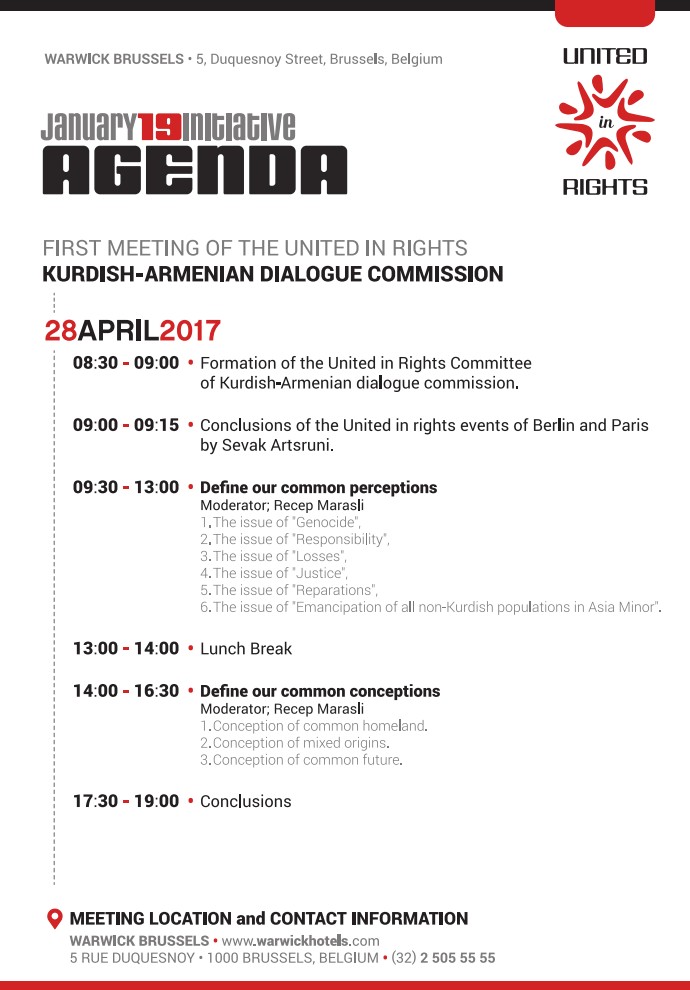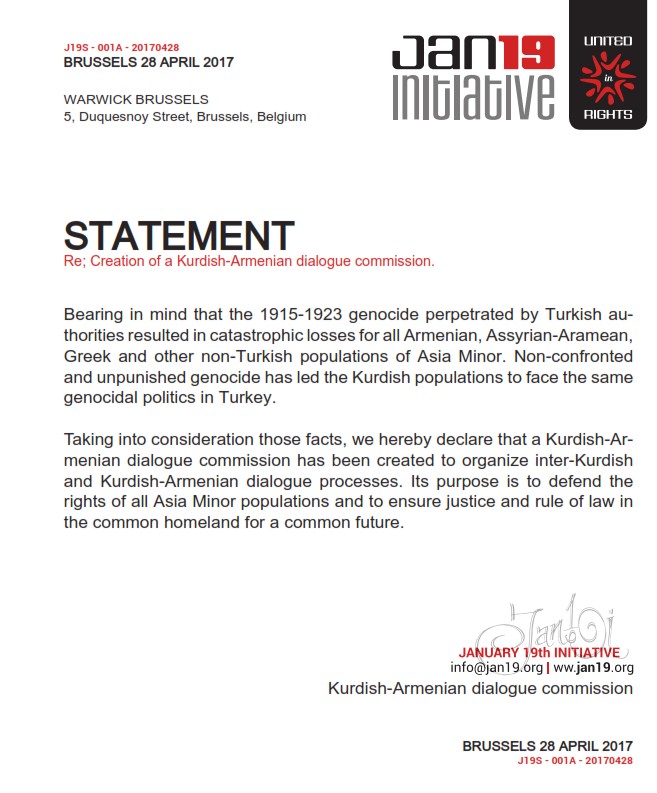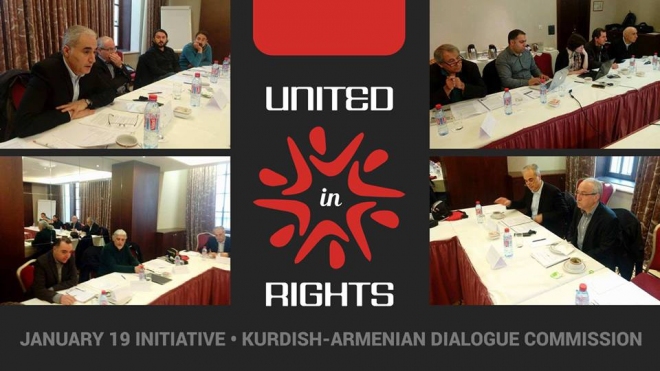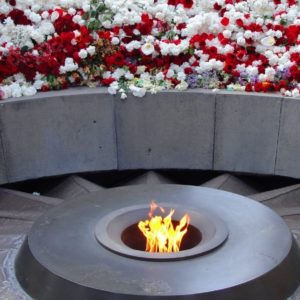Dear Colleagues,
First let me welcome you on behalf of the “National Congress of the Western Armenians” and the “19 January Initiative” to this very important and challenging meeting.
I welcome all Kurdish participants and hail their courage and determination for their unbiased and objective review of the Armenian Issue.
The historic moment that unites us here, is a critical one. As I’m giving this speech, our nations are shedding blood in Sirnak, Kobani, Sinjar and in Karabagh/Artsakh, to stand against the pathetic Neo-Ottoman and Pan-Turkish dreams.
And, while regional powers are all fighting Kurdish self-determination, Armenians and the Republic of Armenia are among the few that seem to favor this historical necessity.
I note, however, to mention without hesitation that many critical issues still divide us. An Armenian– Kurdish friendship is and will remain artificial until both sides accept to face the realities of the past. I personally believe there is nothing we cannot overcome, there are no unsolvable problems, but there is a huge mountain of the unsaid halving us. And it is high time to cross and overcome all obstacles of silence and engage in an open and frank discussion. It is important for us to research history and discover the obstacles that prevented Armenian and Kurdish leaders to unite for a common cause, before, during and after the Genocide.

We are here with a firm will of dialogue. We are here for an eye-to-eye discussion, without apprehension, without fear of ghosts, without third party interference, and in a total free state of mind.
Today we are going to establish a Kurdish – Armenian commission for dialogue and reconciliation. Our aim will be to point all issues without any kind of taboo, interdiction, restriction or anathema. We will pinpoint every fear and suspicion, until we reach the final objectives of peace, justice and cohesion.
Dear Colleagues,
Much has been achieved on both sides to be able to step in this room today and it is with great pleasure and honor that I declare today, that we are not alone in this discussion. All peace loving ethnic, ethno-religious, religious and linguistic groups of Asia Minor, our shared homeland are with us, including democratic secular Turks. Tomorrow another delegation of representatives of the “United in Rights 19 January initiative” will travel to Athens and Thessaloniki to engage large scale discussions with all Asia Minor Greek communities in exile.
In January this year, we met in Berlin and later in Paris to launch the “Asia Minor Peoples’ United in Rights” historical movement. We are now taking our first steps. Last month we published the conclusions of the founding conferences where, in the chapter of the MAIN PRINCIPLES OF DIALOGUE, point number 18 points the following; I quote;
“About the Kurdish historical responsibility we agree on the following positions:
Some Kurdish tribes and individuals participated in the decision making and execution of the genocides whereas the main responsibility belongs to the Young Turkish (C.U.P.) government and Ankara authorities.
Kurdish people benefited materially from the destruction of the Non-Muslim peoples of Asia Minor.
A simple recognition of the historical facts is not sufficient. We therefore appeal to the Kurdish political establishment and elites both in and outside Turkey to join us in this movement of rehabilitation of all the concerned peoples of Asia Minor.”
I believe there is nothing new in this text.
“A group of Kurdish leaders came at last to a realization of the disastrous effects of misguided religious fervor upon their people, as well as the folly and the infamy of the Turks’ Pan-Islamic policy. The Kurdish leaders felt that if the Kurds should continue much longer to serve as a pawn and an instrument in the hands of a mad and unscrupulous ruler, they would not only forfeit forever the right to appeal to the conscience of mankind, the civilized world, but that the Kurdish people would seal the doom of their existence”. These words belong to prince Sureya Bedir Khan one of the founders and leaders of the Xoybum rebellion.
The conscience of Kurds being exploited by Turkish nationalists is not new. It lasts back to centuries and reaches our times.
The 24 of April 2014, the BDP issued a statement and declared; “”We remember the victims of the Armenian Genocide with respect, hoping that similar sufferings will never be experienced again,”
During his presidential campaign the Kurdish leader Mr. Salahettin Demirtas declared, I quote “Everybody including the Kurds participated. But the political authority was the Ottoman regime led by Talaat Pasha, and Djemal Pasha. Whoever gave the orders, carried out the project and made the decisions, that is, the ideology of the government of Union and Progress – should be brought to account before history.”
Never had any Kurdish leader, actor or official statement mentioned anything about the losses Armenians suffered and their rights for compensation.
In October 2014, the National Congress of Western Armenians invited the former mayor of Diarbakir, Mr. Osman Baydemir to Yerevan. In Yerevan, Mr. Baydemir in a solemn statement at the University of Yerevan invited all Armenians to return to their homes.
Mr Baydemir’s invitation opened up the debate; are these statements only futile declarations? Are Kurdish populations and the political establishment ready to consider the return of the Armenians to their historic lands? Are they ready to acknowledge the losses and the rights of the Armenian, Greek, Assyrian and other Asia Minor populations? Can federalism in “Eastern Turkey” solve the current problem? Do Kurdish leaders visualize borders and territorial divisions?
Millions of Islamized Armenians still survive hidden inside Turkey. Are Kurds ready to offer them religious, ethnic, cultural emancipation?
Not only Armenians solicit emancipation. The Founding Conclusions of the Asia Minor United in Rights movement are clear and I quote;
“Our activities cover all ethnic, ethno-religious, religious and linguistic groups in the shared homeland and country of origin, as well as the related Diaspora(s) of the expulsed from Asia Minor people. Three main groups are linguistic, religious and ethnic groups (Armenians, Greeks and Aramaic speaking Christians, etc.); furthermore, our movement includes Non-Muslim, non-Turkish populations (Hamshens, Dersimis (Zaza, Kizilbash, Kurmanc and Kirmanc), Alevis, Yazidis, Nusayri, etc.) and non-Turkish, non-Kurdish Sunni populations (Circassians, Laz, etc.)
Hybrid identities are a bridge for dialogue. They may become accelerators of dialogue between communities.
Peoples of Aramaic origin must be represented according to their chosen self-identification, i.e. as Syriacs, (Syro-) Arameans, Assyrians or Chaldeans.”
Dear Colleagues
Our mission is rough. We are in war for survival. We face totalitarianism, exclusion, massacres, proxy wars, battlegrounds, and unfortunately rising risks of genocide. All these threats, including recent terrific military actions in the Middle East, promise an uncertain future for us all.
In these hard circumstances, we need to unite our efforts and follow our shared objectives for establishing justice and initiating reforms within our shared homeland for our shared rights. We must join our efforts in all legal and peaceful means to achieve this objective in unity.
I would like to close my speech with Martin Luther King’s quote which I believe applies also to us, peoples of Asia Minor: “We must learn to live together as brothers or perish together as fools”.
Statement signed in Brussels 28/4/2017








